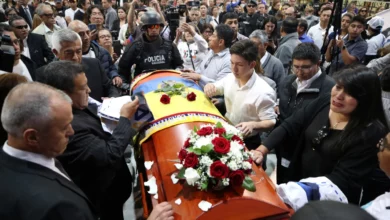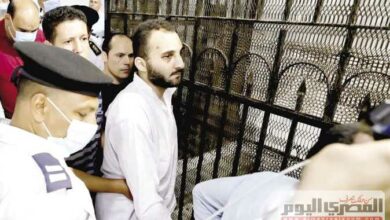
The Interior Ministry stated on Wednesday that its investigation into the death of Italian student Giulio Regeni in Cairo pointed to several possibilities, including that he was killed as an act of revenge or for criminal motives.
The statement, which was published in the MENA news agency, did not mention the possibility of Regeni having been tortured and murdered by Egyptian security forces, as suggested by various news outlets and rights activists.
"The investigation leads to several possibilities, including criminal activity or the desire for revenge due to personal reasons especially as the Italian had many relationships with people near where he lives and where he studied," the ministry said in a statement quoted by state-owned news agency MENA.
Regeni, a 28-year-old Italian studying for his PhD at Cambridge University, went missing in Cairo on January 25, the fifth anniversary of the 2011 uprising that toppled former president Hosni Mubarak. He was in Cairo to conduct research on Egypt's labor movement.
Ten days later, Regeni's body was found by the side of the Cairo-Alexander desert road, apparently showing signs of torture.
Egypt ordered a post-mortem examination before repatriating Regeni's body to Italy, where Italian investigators performed their own post-mortem. Later, Italian Interior Minister Angelino Alfano said that the body showed signs of "something inhuman, animal-like, an unacceptable violence."
Many in the Egyptian and Italian media have speculated that the student was likely abducted and tortured by Egyptian security services seeking to learn of his contacts with opposition figures in Egypt. According to news reports in Italy, the Italian authorities also suspect the Egyptian security services of the student's death.
However, the Egyptian government has rejected such claims, suggesting that criminal or other motives may have been at play. Speaking to Italian newspaper Correire della Sera, Egyptian Foreign Minister Sameh Shoukry said claims of Egyptian security involvement were merely "judgments, accusations and insinuations, unjustified and without proof."
More recently, some Italian journalists have suggested that Regeni may have been gathering information that would ultimately end up in the hands of Western intelligence agencies, unwittingly acting as a conduit for sensitive information about Egypt. They cited the history of links between British universities and their intelligence services, as well as the brief period of time Regeni spent working for British-American security consultancy firm Oxford Analytica.
The consultancy firm was founded by American lawyer David Young, who worked on security issues for US President Richard Nixon and was implicated in the 1972 Watergate scandal, being a co-founder of the "Plumbers" unit responsible for clandestine and illegal activities involving the CIA.
However, other Italian newspapers, such as La Stampa were more skeptical, carrying statements from Regeni's family stating that he was not working for either an Italian or foreign intelligence agency, and that such suggestions were offensive to his memory.
Meanwhile, one of Regeni's professors dismissed suggestions of espionage as "disappointing", but said his university tutors should not have sent him to study the Egyptian labor movement in Cairo at such a sensitive time.
The Egyptian Interior Ministry statement on Wednesday did not say whether "criminal" motives might include terrorism. However, there have been a number of kidnappings and murders committed by ISIS-afilliated terrorists in Egypt in recent years, including at least two targeting Western victims.
In August 2014, William Henderson, an oil worker with US company Apache Oil was killed on the outskirts of Cairo in an attack later claimed by the ISIS-linked Sinai Province group. In July 2015, ISIS-linked terrorists kidnapped Croatian engineer Tomislav Salopek, later releasing pictures said to show his beheaded corpse.
The Egyptian military is fighting an Islamist insurgency against several groups, most notably the ISIS-linked Sinai Province group, with fighting mostly confined to North Sinai.
The Italian government has demanded that Egypt conduct a full investigation and find Regeni's killers. The Egyptian investigation is ongoing, and so far no suspects have been identified.




